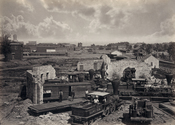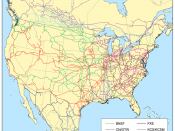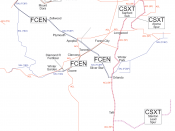Throughout all of American history, there have been many inventions and discoveries that have led us to the triumphant nation that we are today. However, there is one development that really stands out among the many and this is railroads. Railroads have played a huge role in the development and expansion of the United States as an industrialized nation not only as a social advantage, but as an enormous economic one as well. In retrospect, it's difficult to imagine how life would be without the conveniences and amenities of railroads.
The first U.S. railroad lines, built in the late 1820's, soon emerged as America's largest industry. For the first time, a struggling, scattering nation became united in a physical sense. By bringing North America together from sea to sea, the transcontinental lines created an enormous market for American raw materials and manufactured goods. More than any other single factor, the railroad system helped bring about the unprecedented industrialization of the post-Civil War years.
The locomotives opened up new markets for manufactured goods and delivered raw materials to factories. Compared to canals, railroads were faster, cheaper to construct, more reliable, and didn't freeze over the winter. They took farmers out to their land, carried the products of their work to market, and brought them their manufactured necessities. Able to go almost anywhere, they resisted land and weather. Instead of transporting goods on boats through canals and having to wait a few weeks, railroads were now shipping these materials within a few days. Not only did this help America to function more smoothly, but it also aided and improved trade relations with other countries, leading to much economic prosperity for the U.S. Local merchants and farmers bought stock in the new railroad companies which were connecting them to the outside world. Everyone...


